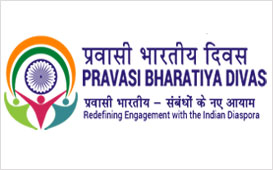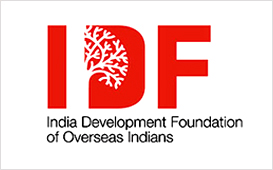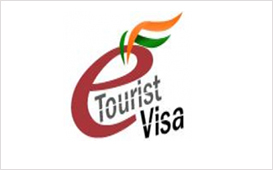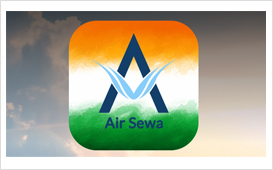Embassy of India
Caracas
Note on Living Conditions
Officially known as the ‘Bolivarian Republic of Venezuela’, Venezuela was named “Little Venice” by European explorers who, on arrival saw the Indian dwellings on stilts in Lake Maracaibo. It is a country of striking natural beauty and dramatic contrasts: the snowcapped peaks of the Andes in the west, and steamy Amazonian jungles in the south; the hauntingly beautiful Gran Sabana plateau with its flat-topped mountains in the east, and 3000 km of white-sand beaches fringed with coconut palms line the Caribbean coast. It boasts of South America's largest lake, Lake Maracaibo, and third-longest river, the Orinoco, and the world's highest waterfall, Angel Falls. It is also home to a wide variety of exotic plants and animals, including the jaguar, ocelot, tapir, armadillo, anteater, and the longest snake in the world, the anaconda.
2. Geography & Climate: Venezuela is located between Latitudes 1oN and 12oN and Longitudes 62o and 73oW. With a territory of 9,16,445 sq. kms, Venezuela is approximately 28% the size of India. Venezuela’sclimate is predominantly subtropical, with a warm temperate zone extending along the coast. Daily temperatures rarely vary more than a few degrees although Caracas can experience up to a minimum of 18o Celsius in winter and a maximum of 33oC in summer. The annual mean temperature ranges from 10° to 25° C (50° to 77° F). Venezuela's climatic zones are defined by rainfall rather than by differences in temperature although certain cities like Maracaibo are normally much hotter, while others like Merida in the hills are cooler. The northern coastal lowlands are relatively arid, but rainfall increases over the Llanos and the Guyana Highlands, with average yearly readings reaching 1,500 mm in both regions. The dry season extends from December to April, and the wet season covers the remainder of the year. The Amazon region has no distinct dry season, and annual rainfall exceeds 2000 mm, distributed evenly throughout the year. The dry season is more pleasant for travelling.
3. Population: The current population of Venezuela is around 31.028.637 in 2016 (according to the projections of the National Institute of Statistics using the 2011 Census Base). The last Census was held in 2011. Venezuela has undergone extensive racial, ethnic and cultural intermixing between the Europeans, Amerindians and Africans since the colonial times. It received large waves of immigrants from Europe following World War II and from other Latin American and Caribbean nations during the 1970s.
4. Religion: Roman Catholic (88%) is the dominant religion while Protestants (10%) and others (indigenous tribal beliefs, Cult of María Lionza in the north-west, African voodoo etc.) form the rest of the population.
5. Language: The official and principal language of Venezuela is Spanish. Working knowledge of Spanish is essential for day-to-day work such as shopping, hiring taxi etc.
6. Caracas: Founded on July 25, 1567, Santiago de León de Caracas or just Caracas, the Capital of Venezuela, is nestled in a vast valley overlooked by an imposing mountain called "The Avila."It is located almost in the centre of the northern coast in a valley encircled by hills. The nearest International Airport (Maiquetia International Airport named after Independence Hero, Simon Bolivar) is situated on the seashore at about 35 kms fromthe city. The nearest sea port is La Guaira, close to the airport. Caracas is connected to both these airport and sea port with a modern highway. The city has an average elevation of about 900 m (2,953 ft) from the sea level and the annual average temperature is approximately 23.33°C (74 °F). Generally, no winter clothing is required for living in Caracas. The city has grown rapidly since the oil boom and the metropolitan area has a population of 5.2 million (2016) and is becoming increasingly congested. Traffic jams are quite common in the city.
7. Monetary Unit and Exchange Rate: The Bolivar (Bs) is the current currency of Venezuela. The present buying rates of Bs in terms of US$ and€ are Bs. 20,254.59 and Bs.22,134.62 respectively. The current official rate of exchange is US$1=Rs.72.25
8. Public Utility Services: The electric current supply in Caracas is AC single-phase 110 volts, 60 cycles. Cooking is done on gas or electricity. The supplied water is not used for coking and drinking. The municipal garbage disposal system is fairly efficient. Multi-storied buildings are provided with garbage disposal chutes.
9. Postal Services: Postal services are slack and people generally prefer the courier services which are considered to be fast and more dependable. There are telephone booths all over the city and the telephone service is generally dependable. SIM cards for Mobile phones can be obtained easily. International calling can only be done through landlines or using mobile applications like WhatsApp, messenger. There is no international calling facility from Mobile phones.
10. Standard of living: The gap between the small percentage of rich and middle class people and the vast majority of the poor people is quite stark in Venezuela. The cost of living in Venezuela is one of the highest in Latin America as the country has one of the highest inflation rates in the world (according to the Venezuelan National Assembly, the annual inflation from January to November 2017 is 825.7%). The prices of food articles like fruits, vegetables, oil etc. are very high. Venezuela is going through a phase of hyper-inflation and is facing a severe shortage of essential items, such as rice, edible oil, long-life milk, sugar etc. The items simply disappear from the market and it would be difficult to find them for months at a stretch. One has to keep sufficient stock of things for survival.
11. Law and Order: Venezuela has one of the highest crime rates in the world in the last few years. While the areas where the Embassy and most of our residences are located are relatively safe, the law and order situation in general is worrisome. The incidents of crimes like mugging, kidnapping, murder and thefts of vehicles in Caracas are rampant, and it is advisable to be very cautious. Because of the random nature of crime, one has to be very careful about one’s movements etc. Several incidents of crimes against diplomats have also occurred in the recent past. Generally, the rented apartments in multi-storied buildings have multilayered security arrangements. It is advisable not to resist any attempt to mugging/robbery, which might result into serious physical harm. For shopping and other occasions, it is advisable for wear western informal dresses (jeans, trousers etc.) for security reasons.
12. Chancery: The Chancery is a government-owned three-storied property known as Quinta Tagore in the La Floresta neighborhood of Caracas (Address: 12, Avenida San Carlos, La Floresta, Caracas), which is regarded as relatively one of the safe neighborhoods of Caracas. The working hours are Monday to Friday, 8.00 a.m. to 4.30 p.m., with lunch break from 1230 hrs to 1300 hrs. Telephone Nos. are (58-212) 285.7887/285.3806/286.6498/285.3637; Fax (58-212) 286-5131; E-mail address is: hoc.caracas@mea.gov.in&admin2@mea.gov.in. Mission’s webpage is www.eoicaracas.in
13. India & Indian Community: India is greatly admired by Venezuelans for its philosophy, wisdom, arts and culture and there is no prejudice or discrimination against Indians. There is considerable interest in Yoga, Vedanta, Philosophy and Mahatma Gandhi and Rabindranath Tagore are known to many Venezuelans. There are two statues of Mahatma Gandhi in Venezuela. There area number of Indian cultural institutions like Institute of Vedic Studies, Satya Sai Baba Centres, ISCON followers, Chaitanya Saraswat Math, a Shiva Temple, a number of yoga centres and Radhaswami followers in Caracas. There are two mosques in Caracas catering mainly to Syrian and Lebanese migrants. Cremation facilities are available in Caracas.
14. The total number of Indians/PIOs in Venezuela are estimated to be around 30. The Indians present in Venezuela are mostly in retail business, employees of Indian oil company (OVL) etc. All the pharmaceutical companies have left because of the dire security environment and deteriorating economic conditions. It is difficult to persuade Indian businessmen to engage commercially with Venezuela, let alone locate their activities here, because of security issues and difficulties experienced in repatriation of foreign exchange due to stringent exchange controls.
15. Approved route of travel: The approved routes for travel from India to Venezuela and vice versa are:
- Delhi-New York (AI) - Bogota (FC) -Caracas(FC) and vice versa
- Delhi -Paris (AI) – Caracas (FC) and vice versa
- Delhi - Madrid (AI) – Caracas (FC) and vice versa
One-day scheduled halt at New York, Paris and Madrid is officially permitted for all types of official journeys (only one day’s stay, regardless of flight timings, on station of Scheduled Halt). For up to 90 days, no visa is required on Diplomatic and Official Passports for entry into Venezuela. Valid Yellow Fever vaccination is a must for travelling from Venezuela to India or other Latin American countries.
16. Local transportation: Caracas has an underground Metro System but it does not connect the entire city. Because of the language constraints and the widespread security concerns in the city, diplomats, officials and their family members are advised not to travel by metro. Public and private buses ply on certain routes but again it is not advisable to take them in view of security concerns. Taxis are available but the condition of the vehicles are poor. It is advisable to take taxis only from the Sitios (Taxi Stands). Most of the taxi drivers speak only Spanish and it is important to know the language to be able to deal with them independently.
17. Security: Due to difficult security situation in Venezuela, it is not advisable to move around in Caracas on foot after sunset and early morning. A car is, therefore, a must especially for representational officers. Prices of good cars are exorbitant locally and at present the dealers in USA are not supplying cars to Caracas. Those coming to Caracas on direct posting should check the position regarding import of cars. The steering wheel is on the left side and the traffic is on the right side of the road.
18. Cars: Diplomats are allowed to import one car of any make, duty-free during one posting. However, in case one has to sell the car before the stipulated time (about 3 years), one will have to pay back the proportionate import duty to the Venezuelan Government. The process of registration of cars in Venezuela is extremely cumbersome and it may take several months. Likewise, one has to start the process of selling the car at least three months before departure in order to ensure that all the process is completed in time. Sale proceeds of cars can’t be repatriated. Actual repatriation might take months. Due to the widespread insecurity in Caracas and the country in general, foreign diplomats in Venezuela are not known to travel around the country on their own unless it is in a group or arrangements are made through travel agencies. Since the toll roads have been done away with by the present Government, highways are poorly maintained compared to international standards and one has to be careful about potholes on the roads while driving.
19. Driving License: The local driving license for diplomats and officials is issued by the Venezuelan Government and generally it does not take a long time. A medical certificate is required for obtaining the driving license. The driver must be over 18 years of age.
20. Accommodation: ‘Quinta Bharat’ – the Embassy Residence is a large double-story house in the Country Club area at about three kilometers from the Embassy. There is another GOI property at Quinta Ashoka’ – meant for two India-based representative officers. The other officials live in rented furnished apartments within walking distance from the Chancery. For safety and security reasons, it is important to rent apartments close to the Chancery, in Chacao Municipality, which is regarded as relatively safe area in Caracas. These apartments usually have modern sanitary/ electrical fittings and are also provided with gas/electric stove and refrigerator. However, no crockery, cutlery and kitchenware are normally supplied. The newcomers are advised to bring these articles in their baggage.
21. Health and Medical Facilities: Caracas generally has pleasant and healthy weather throughout the years, but precaution is necessary against gastroenteritis, diarrhea and hepatitis. Flu is a common problem and there are outbreaks two to three times a year. It is common to find running nose, cough etc. in children and even adults during several times in a year. Centro Medico Docentr La Trinadad(CMDLT)and Instituto Medico la Floresta are two hospitals on the Embassy’s panel. Both hospitals are regarded among the best private hospitals in Caracas. Only some doctors speak English. Generally, the doctors give appointments on a priority basis to Embassy officials but sometimes one has to wait for theappointment. Most of the lifesaving medicines are in severe short supply and people are making their own arrangements of sourcing medicines from other countries. It is advisable to bring sufficient stock of prescription and off the counter medicines from India or elsewhere because all the medicines/compounds are not available locally. Ministry has recently approved Bogota as an alternative place for emergency medical treatment.
22. Water: Tap water is not potable and bottled water needs to be purchased for cooking and drinking. The water companies supply water gallons at residences.
23. Food: The cereals, meat, milk, butter, fresh fruits and vegetables are generally available. Basmati rice is available but at exorbitant prices. Wide variety of fruits are available – banana, pineapple, pomegranates, watermelon, melon, guava, lime, mango, grapes, pears, and oranges, apart from some typical local fruits. The prices of food stuff and fruits are, however, quite high since most of them are imported. There are wide varieties of fresh vegetables, though a few typical Indian ones, like parmal, tinda, kathal etc. are not available. Some vegetable such as karela (bitter gourd), okraare available in the Chinese market which is open on Sundays. The country is going through a bad economic phase and there is a severe shortage of staple food items like rice, wheat flour. For years, sugar has vanished from the shelves of supermarket. Cooking oil is sometimes found in limited store but mostly vanishes from the market.
24. Well-known brands of tinned foodstuff are available in the local market. Of late it has been found that several Indian spices/condiments are available in the local market but they are costly. However, special preparations like dal masala, sambhar masala etc. have to be brought from India. Pulses and lentils of some varieties (rajma, beans, whole masoor, moong (sabut) and white grams) are sometimes available. Arhar, chanaandurad dals are not available. Good quality tea is not available. Tea bags available locally are of poor quality and expensive. Coffee seeds, coffee powder and instant coffee are reasonably priced and are of good quality. Those coming on postings are advised to bring reasonable quantities of tea, spices, pulses, besan, basmati rice etc. with them. Fish and other seafood are available freely all year round. Mutton is available at selected places only. There are at present no Indian restaurants in Caracas.
25. Clothing: On formal occasions,men generally wear suits throughout the year. For evening parties, dark suits are generally preferred. Good quality suits may be very costly in Caracas. It is, therefore, advisable to bring sufficient number of suits etc. from India or elsewhere. On ceremonial occasions, Indian national dress is recommended. Indian ladies generally wear saris/salwar suits for all social occasions. Since these Indian dresses are generally not available locally, it is advisable to bring them from India or elsewhere. An umbrella is useful during the rainy season. Caracas is quite fashion-conscious and high-end branded clothing/shoes/sandals/handbags etc are available in Caracas but they are generally very expensive.
26. Laundry, etc.: Dry-cleaning and laundry facilities in Caracas are good and efficient. Most of the families prefer to do their own laundry and ironing as several apartments have washing and drying machines. Caracas is dotted with good hair dressing/cutting saloons for ladies and gents. Their cost may vary depending upon the area in which they are located.
27. Domestic Appliances/ Household effects: Those coming on posting are advised to bring their personal requirements and electric gadgets of dual voltage (110V and 220V), like TV, VCR, iron etc. for use during their stay in Venezuela. It is also advisable to bring from India household cooking utensils, especially required for Indian cooking, e.g., tawa, chakla-belan, silbatta, heavy-duty mixer-grinder(for South Indian dishes) etc. Other gadgets of 110 voltages are available locally in a good range but at exorbitant prices. The TV transmission works on NTSC 358 system.
28. Domestic help: Reliable and steady domestic help is difficult to get and when possible, they are very expensive. Usually they do not speak English. Very few waiters speak English and they are quite costly.
29. Education: The academic year in these schools is from August to June.The Embassy has the following two English-medium schools in Caracas on its approved panel:
(i) Escuela Campo Alegre Up to 12thGrade (American Intl. School +IB)
(ii) British School of Caracas Upto 12thGrade (IGCSE + IB) / Year 13
30. The Central University of Venezuela (UCV) is the largest public Universality in Venezuela with most of the departments, including medicine. However, most of the education in Venezuela is imparted in Spanish language.
31. Amusement and Recreational facilities: Recreational facilities in Venezuela include: Visual arts, clubs, theatres, local music which is an eclectic blend of European, African and indigenous rhythms, films (mostly from Hollywood with subtitles/dubbing in Spanish), art galleries, museums, cultural activities organized by various Ministries, islands, beaches and mountain resorts, places of cultural/historical/religious interest etc. Cable TV facility is normally available at all residences. The Embassy has a modest collection of Hindi films and music.
32. Baggage: Diplomats enjoy usual duty-free import facilities but due to a very cumbersome process for duty-free clearance, high charges for the documentation, commission for clearing agents and demurrage charges etc. this facility is seldom availed of.
33. Since there is no direct shipping service between India and Venezuela, it takes around 12 weeks for the unaccompanied heavy baggage to reach Venezuela by sea. The procedure of customs clearance at the seaport is not only cumbersome but also time-consuming. In some cases it took more than three months to clear the heavy baggage after it reached the port in Venezuela, and this is after a 3 month trip from India.However, there is an improvement in this area recently. These points may kindly be taken into account while planning to move to Caracas on posting.
34. After shipping goods to Venezuela, upon transfer, details like the copies of Airway Bill & Bill of Lading, number of pieces, total weight, packing list, and likely date of arrival must be sent to the Foreign Ministry to get necessary authorization. The Identity Card issued by the Foreign Office is required for the purpose. The foreign Ministry has addressed the problem of delay in issuing the permits but it may take time sometimes. The Delay in customs clearance involves demurrage charges.
35. Bank Account: Since dollar accounts are not possible in Venezuela, the Embassy credits the monthly salary to the State Bank of India, 460 Park Avenue, New York, NY 10022 Tel. No. (001- 212) 521 3318and Email ID: mgrretail.nyb@statebank.com. A bank account (Money Market Deposit Account) can be opened in SBI, New York after coming to Venezuela.To access website please go to www.sbinewyork.com
Some Suggested Readings on Venezuela are:
- Simon Bolivar – A Continent Destiny by Salcedo Bastardo. (This book has been translated into Hindi by ICCR).
- In the Shadow of the Liberator – Richard Gott
- Simon Bolivar by Gerhard Masur
- A history of Latin America by George Pendle.
- Guide to Venezuela by Janice Bauman and Leni Young.
- Venezuelan Folkways by Dorothy Kamen.
- The Politics of Oil in Venezuela by Franklin Tugwell.
- Venezuela by Charles Brewer.
- The Search for El Dorado by John Hemming (it offers a fascinating insight into the conquest of Venezuela).
- Venezuela: A Century of Change by Judith Ewel provides a comprehensive 20th century history.
- Lonely Planet Edition on Venezuela
=======================
September, 2019























